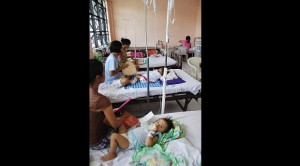
INDIGENT PATIENTS are bearing the brunt of the eco-enterprise fallout, from higher hospital charges and fees to lack of drugs at the pharmacy. FERNAN GIANAN/INQUIRER SOUTHERN LUZON
(Conclusion)
VIRAC, Catanduanes—Eastern Bicol Medical Center (EBMC), which morphed into an economic enterprise, did not pass the test of viability, hospital officials told the Regional Trial Court here in a petition. In the first place, they said, it did not have seed money.
In contrast, La Union Medical Center (LUMC), which the technical working group and provincial board members visited before the approval of an ordinance establishing EBMC as a business venture, had received P650 million in grant from the European Union, according to lawyers Christopher Mortel and Gil Taway Jr.
The money was used to transform the facility into a world-class, 134-bed medical center.
“Comparatively, EBMC’s infrastructure is extremely deficient and in desperate shape,” the lawyers said. It does not even have an ambulance and is chronically lacking in medical oxygen, with many laboratory services sourced outside, they said.
“No patient will come, even if the employees are hardworking,” Taway said in Filipino.
The petition, filed by EBMC Employees Association president Vicente Torno, Nanette Molina, Veronica Angeles, Jocelyn Madera, Juan Sicio, Naidah Shaheed Rendon, Gilda Taniegra, Yolanda Palino and Dr. Elmer Tatad in January, seeks the court’s issuance of a temporary restraining order and preliminary injunction to stop the provincial government from enforcing the ordinance.
The court, however, denied the petition for a TRO, saying that the petitioners would not suffer any “irreparable injury” pending its decision.
Ordinance No. 001-2010 converted EBMC into a corporation owned and controlled by the provincial government. The hospital employees have assailed the law as “afflicted with patent invalidity and unconstitutionality” and cited procedural errors in its approval two years ago.
While LUMC has drawn many clients from neighboring provinces of La Union, EBMC cannot hope to attract paying patients from the Bicol mainland due to its geographical isolation and inadequate services, Mortel and Taway said.
Even the poor would find it difficult to pay for services at EBMC, they added, with the abolition of the Priority Development Assistance Fund (PDAF) removing a financial source for medical assistance. In 2011, 2,300 patients were given such assistance from the P2.8 million allocated from the PDAF of Rep. Cesar Sarmiento, P400,000 from a party-list group and P1 million from the provincial government.
The economic enterprise should be self-sustaining, Mortel said, but based on its cash flow over the past three years, employees would be the first to be affected by the failing finances and EBMC would die a natural death.
“This would defeat the employees’ security of tenure,” he stressed. He noted that the monthlong delay in salaries and nonpayment of night differentials violated the Magna Carta for Public Health Workers, which aims to uplift the economic well-being of health workers.
Many have resorted to usurious loans just to make ends meet, Mortel said.
In the meantime, the provincial government, already freed from the financial strain of addressing the salaries and benefits of EBMC employees, approved a pay raise in early 2013. The decision, EBMC employees said, was made at their expense.
Last January, representatives of the 141 hospital workers trooped to the capitol to bring their clamor to Gov. Araceli Wong herself, who expressed her inclination to revert EBMC back to its original state. To their dismay, Wong created a committee to evaluate EBMC operations instead of certifying as urgent the proposal for reversion.
The employees met with Vice Gov. Jose Teves Jr. and the other provincial board members, but they failed to obtain any assurance on the issue.
Teves told the group that EBMC as an economic enterprise might not be reverted to its old structure because doing so would result in the province’s budget for personal services exceeding the mandated ceiling of 45 percent, leading to restrictions in filling up vacant positions.
Capitol officials also said it would be difficult for EBMC to comply with the Department of Health’s requirement for licensing as a tertiary-level hospital.
Teves vowed to recommend the infusion of P50 million as additional seed money for the EBMC enterprise and full autonomy in its operations.
Last week, the rescheduling of court hearings had left the petitioners fearing that they would continue to suffer more from the failing venture.
Now, they plan to bring their case to President Aquino and to Health Secretary Enrique Ona, who recently mentioned a plan to take back from local government units the direct supervision of provincial health officers and, hopefully, control of provincial hospitals.